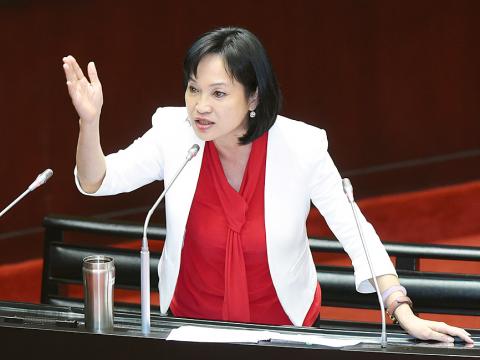The results of Saturday’s nine-in-one elections represented a failure of the Democratic Progressive Party (DPP), not a victory for the Chinese Nationalist Party (KMT), KMT Legislator Ko Chih-en (柯志恩) said on Sunday.
The KMT must not misread the situation and must continue to reform itself to win back votes from the DPP, Ko said.
The KMT won mayoral races in 15 counties and cities, up from six, while the DPP won only six, down from 13.

Photo: Liao Chen-huei, Taipei Times
Key KMT candidates, including Kaohsiung mayor-elect Han Kuo-yu (韓國瑜) and New Taipei City mayor-elect Hou You-yi (侯友宜), are different from typical KMT politicians, Ko said, adding that the two relied on their unique personalities.
“The outcome shows that people do not like the DPP, but that does not necessarily mean they like the KMT. This is something the party must realize,” she said.
KMT Legislator Wang Jin-pyng (王金平) said the biggest reason for the DPP’s losses was a change in public sentiment.
All of the DPP’s actions since the party took office helped the campaigns of KMT candidates, Wang said.
KMT Legislator Lin Wei-chou (林為洲) said that voters expressed their dissatisfaction with the DPP, but not necessarily their approval of the KMT.
The KMT must urgently get to work turning dissatisfied DPP supporters into KMT supporters before the 2020 presidential election, Lin said.
The KMT must reform and should learn from Han’s campaign success, which would include better engagement with voters online and more emphasis on the charisma of individual candidates, he said, adding that the party could not rely on its traditional organizational strategies.
A source within the KMT who asked to remain anonymous said that there was hope that older members would soon retire.
However, the party’s successes on Saturday means that older members would probably join the 2020 elections rather than retire, the source said.
The boost in morale that Han has given party members means there will likely be an explosion in the number of KMT members who want to enter the party’s 2020 nomination process, the source said, adding that the party would be obligated ensure a fair competition.

Beijing could eventually see a full amphibious invasion of Taiwan as the only "prudent" way to bring about unification, the US Department of Defense said in a newly released annual report to Congress. The Pentagon's "Annual Report to Congress: Military and Security Developments Involving the People's Republic of China 2025," was in many ways similar to last year’s report but reorganized the analysis of the options China has to take over Taiwan. Generally, according to the report, Chinese leaders view the People's Liberation Army's (PLA) capabilities for a Taiwan campaign as improving, but they remain uncertain about its readiness to successfully seize

Taiwan is getting a day off on Christmas for the first time in 25 years. The change comes after opposition parties passed a law earlier this year to add or restore five public holidays, including Constitution Day, which falls on today, Dec. 25. The day marks the 1947 adoption of the constitution of the Republic of China, as the government in Taipei is formally known. Back then the Chinese Nationalist Party (KMT) governed China from Nanjing. When the KMT, now an opposition party in Taiwan, passed the legislation on holidays, it said that they would help “commemorate the history of national development.” That

Trips for more than 100,000 international and domestic air travelers could be disrupted as China launches a military exercise around Taiwan today, Taiwan’s Civil Aviation Administration (CAA) said yesterday. The exercise could affect nearly 900 flights scheduled to enter the Taipei Flight Information Region (FIR) during the exercise window, it added. A notice issued by the Chinese Civil Aviation Administration showed there would be seven temporary zones around the Taiwan Strait which would be used for live-fire exercises, lasting from 8am to 6pm today. All aircraft are prohibited from entering during exercise, it says. Taipei FIR has 14 international air routes and

The Ministry of National Defense (MND) today released images of the military tracking China’s People's Liberation Army (PLA) movements during the latest round of Chinese drills around Taiwan. The PLA began "Justice Mission 2025" drills today, carrying out live-fire drills, simulated strikes on land and maritime targets, and exercises to blockade the nation's main ports. The exercises are to continue tomorrow, with the PLA announcing sea and air space restrictions for five zones around Taiwan for 10 hours starting from 8:30am. The ministry today released images showing a Chinese J-16 fighter jet tracked by a F-16V Block 20 jet and the